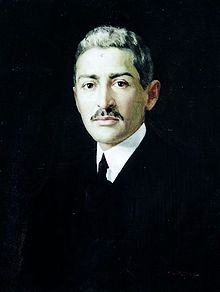Ion Dragoumis
Ion Dragoumis ( Greek Ίων Δραγούμης , born September 2, 1878 in Athens ; † August 13, 1920 ibid) was a Greek diplomat , writer and politician .
Life
Dragoumis came from a respected family. His grandfather Markos Dragoumis was a leader of the Greek liberation struggles . Ion Dragoumis was one of eleven children of Stephanos Dragoumis , who belonged to numerous governments as Foreign, Interior and Finance Minister and in 1910 as Prime Minister.
Dragoumis studied law at the University of Athens and took part in the Turkish-Greek war as a volunteer in 1897 . In 1899 he entered the diplomatic service. He served as Vice Consul in Monastir and Consul in Serres , Plovdiv , Burgas , Alexandria and Alexandroupoli . In 1907 he was transferred to the embassy in Istanbul .
While working in Alexandria, he met the writer Pinelopi Delta , with whom he shared a passionate love and years of pen friendship, until Dragoumis turned to actress Marika Kotopouli in 1912.
During the First Balkan War he was the envoy of the Crown Prince and later King Constantine I in Thessaloniki .
In 1915, Dragoumis moved from diplomatic service to politics. In the controversy between royalists and republican supporters of Eleftherios Venizelos , he was one of the latter's staunch opponents. He was elected to the Greek Parliament as a member of Florina . Due to differences of opinion with the king, who resisted entering the war even after the occupation of a large part of Eastern Macedonia by Bulgaria, Dragoumis had to go into exile in Corsica in 1917 .
After an attack on Eleftherios Venizelos at the Gare de Lyon in Paris on August 12, 1920 , Dragoumis was killed by followers of Venizelos' the following day.
Literary work
As a writer, Dragoumis was the most important representative of Greek nationalism. As an alternative to the pure nation state, however, he had the vision of a multi-state confederation, a continuation of the Byzantine and Ottoman empires , which, however, would be dominated by the Greeks due to their cultural superiority.
Dragoumis played an important role in the dispute with the Bulgarians over Macedonia. In his work "Martyron ke Iroon Ema" (Blood of Martyrs and Heroes) published in 1907 , he identified the Bulgarians as future enemies of the Greeks - after the Ottomans - and conjured up the model of the " Bulgar slayer" Basil II.
He was one of the ardent advocates of the Dimotiki on the Greek language question .
Works
- Το Μονοπάτι To Monopati (The Path), 1902
- Μαρτύρων και ηρώων αίμα Martyron ke Iroon Ema (Blood of Martyrs and Heroes), Athens 1907
- Σαμοθράκη Samothrace (Samothrace), Athens 1908
- Ελληνικός Πολιτισμός Ellinikos Politismos (Greek civilization), Athens 1913
- Κοινότης, Έθνος και Κράτος Kinotis, Ethnos ke Kratos (community, nation and state)
- Ο ελληνισμός μου και οι Έλληνες O Ellinismos ke i Ellines (Hellenism and the Greeks), 1927
Honors
- The village of Ionas Dragoumis is named after Dragoumis, a municipality that was independent until 2010 and today belongs to the municipality of Argos Orestiko . The Dragoumis family came from here.
- A statue by Ion Dragoumis by the sculptor Giannis Pappas was erected in Makedomachon Square in Thessaloniki . In Thessaloniki a street is named after Dragoumis.
- At the intersection of Vasilissas Sofias Street and Moni Petraki Street in Athens, the place where he was killed, a memorial column commemorates the end of Dragoumis.
Individual evidence
- ↑ Bruce Merry : Encyclopedia of modern Greek literature. Westport 2004, p. 116 (digitized extract from Google Books ) (English)
- ↑ Susanne-Sophia Spiliotis: Transterritorialität and National demarcation. Munich 1998 p. 127, footnote 12 (digitized extract from Google books )
- ↑ Michael Llewellyn Smith: Ionian vision. Greece in Asia Minor 1919–1922. London 1973, p. 144 (digitized excerpt from Google Books ) (English)
- ↑ Ioannis Zelepos : The Ethnization of Greek Identity, 1870–1912. Munich 2002, p. 200 (digitized extract from Google books )
- ↑ Ioannis Zelepos: The Ethnization of Greek Identity, 1870–1912. Munich 2002, p. 207 (digitized extract from Google books )
- ↑ Alexander von Bormann: Non-simultaneities of European Romanticism. Würzburg 2006, p. 86 (digitized extract from Google books )
- ↑ Anastasia N. Karakasidou: Fields of wheat, hills of blood: passages to nationhood in Greek Macedonia. Chicago 1997, p. 92 (digitized excerpt from Google books ) (English)
- ↑ Susanne-Sophia Spiliotis: Transterritorialität and National demarcation. Munich 1998 p. 147 (digitized excerpt from Google books )
- ↑ Directory of the works of Giannis Pappas ( Memento of the original from June 14, 2011 in the Internet Archive ) Info: The archive link has been inserted automatically and has not yet been checked. Please check the original and archive link according to the instructions and then remove this notice.
Web links
- Mark Dragoumis: Ion Dragoumis, The Misguided Patriot. Athens News of July 29, 2005
| personal data | |
|---|---|
| SURNAME | Dragoumis, Ion |
| ALTERNATIVE NAMES | Δραγούμης, Ίων (Greek) |
| BRIEF DESCRIPTION | Greek diplomat, author, politician |
| DATE OF BIRTH | September 2, 1878 |
| PLACE OF BIRTH | Athens |
| DATE OF DEATH | August 12, 1920 |
| Place of death | Athens |
